CLAT Mock Test 2026
In India, a special examination for aspirants who are interested in pursuing law is conducted. It is known as the Common Law Admission Test. While preparing for it, you need to do more than just read books and memorize concepts. You should use the CLAT mock test on the educational platform of Mockers to simulate the real exam experience and perform at your best in the upcoming exam.
The CLAT mock test 2026 is crafted carefully by our team of experts to reflect the latest exam pattern, question types, as well as difficulty levels. Also, each test comes with a timer, instant performance analytics, and detailed solutions to all questions. By using this resource, you will not only be able to build your confidence but also improve your speed and accuracy, which are two critical skills that are needed to crack this examination.
Highlights Of The Common Law Admission Test
In the table mentioned below, you can find all the important highlights related to the Common Law Admission Test.
|
ASPECT |
DESCRIPTION |
|
Name of the Test |
CLAT: Common Law Admission Test |
|
Test Conducting Organization |
Consortium of National Law Universities |
|
Level of the Test |
National level |
|
Purpose of the Test |
Admission into undergraduate and postgraduate law programs across different universities. |
|
Frequency of the Test |
Annual |
|
Mode of the Test |
Offline: pen-and-paper-based test |
|
Online Enrollment for CLAT 2026 |
1st August 2025 to 31st October 2025 |
|
CLAT 2026 Exam Date |
7th December 2025 (Sunday) 2:00 pm to 4:00 pm |
|
Type of Questions in the Test |
Multiple choice questions |
|
Number of Questions and Maximum Marks |
|
|
Subject Areas Covered in the Test |
|
|
Marking Scheme in the Test |
|
|
Official CLAT Website |
CLAT Mock Test 2026 Along With Solutions
We provide a series of the CLAT free mock test along with accurate solutions to each question for completely free attempts. You can utilize them on the platform with just a stable internet connection. These solutions also include detailed explanations that help you understand the underlying principles. With their help, you can also find the areas that need improvement and work on them during focused study sessions. The links to these test series are also given for each usage.
Eligibility Criteria For The Upcoming Common Law Admission Test
Some information regarding the next CLAT examination is mentioned in detail below.
- In the Undergraduate Common Law Admission Test, there is no upper age limit.
- You must have cleared the 10+2 examination with 45% of marks or its equivalent in grade. 40% marks or an equivalent grade are required for SC/ST/PwD category candidates.
- If you are still appearing for the qualifying examination in the same year, then also, you can apply for CLAT. However, you are required to produce evidence of your passing the qualifying examination during the admission. If you fail to do so, then you will lose the right to be considered for admission.
How To Take The Mockers’ CLAT Free Mock Test?
We have given the steps that you should follow to attempt the free CLAT mock test on our digital platform below.
- Use any browser on your device to type www.mockers.in in its search space.
- On the website, you should click on the ‘Navigation’ bar, and from the menu, select the ‘Exam Categories’ section.
- Then, you should scroll down and tap on the ‘Law’ option.
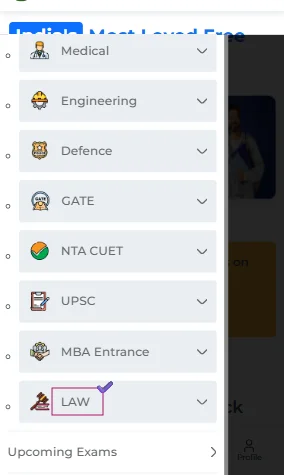
- Now, you can choose the ‘CLAT UG’ icon to open the page of the CLAT free online mock test.
- You have to click on the ‘Explore’ button under the CLAT mock test online free.
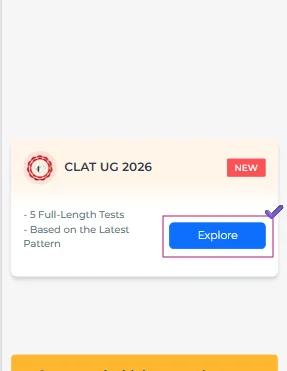
- Various tests will appear in the list. You can select any CLAT UG free online mock test series and tap on its ‘Start’ icon.
- Finally, you should go through the given instructions of the CLAT mock test carefully and click on the ‘Start’ button again to attempt it.
CLAT UG Syllabus
The details regarding the official syllabus of the CLAT- Undergraduate is mentioned below for your reference.
English Language: In this section, you will be given passages of about 450 words each. They will be derived from contemporary or historically significant fiction and non-fiction writing and would be of a standard that a 12th standard student may be able to read in about 5-7 minutes.
The passage will have a series of questions in which you need to demonstrate your comprehension and language skills, including your abilities to:
- Read and comprehend the main point discussed in the passage, as well as any arguments and viewpoints discussed or set out in the passage.
- Draw inferences and conclusions based on the passage.
- Summarise the passage.
- Compare and contrast the different arguments or viewpoints set out in the passage.
- Understand the meaning of various words and phrases in the context used in the passage.
Current Affairs, including General Knowledge: This section will also have passages of around 450 words each. The passages will be based on news, journalistic sources, and other non-fiction writing. The questions might have an exam of legal information or knowledge that is discussed in or related to the passage, but will not require any additional knowledge of the law beyond the passage.
Every passage will follow a series of questions in which you have to demonstrate your awareness of various aspects of current affairs and general knowledge, including:
- Contemporary events of significance from India and the world.
- Arts and culture.
- International affairs.
- Historical events of continuing significance.
Legal Reasoning: This section’s passages can relate to fact situations or scenarios involving legal matters, public policy questions, or moral philosophical enquiries. You don’t need to have any prior knowledge of law to attempt these questions. You will benefit from a general awareness of contemporary legal and moral issues to better apply general principles or propositions to the given fact scenarios.
The questions of these passages will require you to:
- Identify and infer the rules and principles set out in the passage.
- Apply such rules and principles to various fact situations.
- Understand how changes to the rules or principles may alter their application to various fact situations.
Logical Reasoning: This section will include a series of short passages, and they will be followed by one or more questions in which you have to:
- Recognize an argument, its premises, and conclusions.
- Read and identify the arguments set out in the passage.
- Analyze patterns of reasoning critically, assess how conclusions may depend on particular premises or evidence, and how conclusions may be strengthened or weakened as a consequence of an alteration in premises or supporting facts.
- Infer what follows from the passage and apply these inferences to new situations.
- Draw relationships and analogies, identify contradictions and equivalences, and assess the effectiveness of arguments.
Quantitative Techniques: In this section, there are short sets of facts, propositions, or other textual representations of numerical information. They are followed by a series of questions in which you have to derive information from the questions and apply mathematical principles to them.
In these questions, you need to:
- Derive, infer, or manipulate numerical information set out in such passages.
- Apply various 10th standard mathematical operations on such information, including areas like ratios and proportions, basic algebra, mensuration, and statistical estimation.
Important Topics Included In Each Section Of The Common Law Admission Test
All the topics that are a part of the CLAT sections are elaborated in the table mentioned below.
|
SECTION |
MAJOR TOPICS |
SUBTOPICS |
|
English Language |
Reading Comprehension |
|
|
Vocabulary |
|
|
|
Grammar and Sentence Correction |
|
|
|
Current Affairs, including General Knowledge |
Static General Knowledge |
|
|
Current Affairs |
|
|
|
Legal Reasoning |
Legal Principles and Application |
|
|
Legal Awareness |
|
|
|
Logical Application |
|
|
|
Logical Reasoning |
Critical Reasoning |
|
|
Analytical Reasoning |
|
|
|
Syllogisms and Logical Puzzles |
|
|
|
Quantitative Techniques |
Basic Arithmetic |
|
|
Data Interpretation |
|
|
|
Word Problems |
|
Key Features Of Mockers’ Free CLAT Mock Test
Below are the points that explain some of the amazing features that are a part of our CLAT mock test 2026.
- Every CLAT free mock test is completely free. There are no hidden charges, subscriptions, or paywalls. You can attempt as many mocks as you want, anytime, without any restrictions. We do this so that quality education is accessible to every aspirant, regardless of their financial background.
- The free CLAT mock test is created to match the most recent syllabus, structure, and question trends of the exam. Our team keeps analyzing the changes in the official papers and updates the test format accordingly. In this, the number of questions, section-wise weightage, reading comprehension length, legal reasoning case studies, and even question tone are included.
- On our platform, you will get a realistic environment of the exam in the CLAT free online mock test. From a countdown timer to the question navigation panel, we design everything to replicate the conditions of the real exam. With this, you can train your mind to stay calm under pressure, manage time effectively, and improve your focus for the actual day of the test.
- Once you have completed the CLAT mock test online free, our system will generate a comprehensive report of your performance. In this, you will find section-wise breakdowns, total score, accuracy percentage, time spent on each question, and overall rank. With the help of this feedback, you can then track your strengths as well as weaknesses and make decisions about what to revise next.
- After submission of the CLAT UG free online mock test series, you can review all your answers along with the correct ones. Each question also includes a step-by-step explanation through which you can understand the logic behind the correct answer. These explanations are concept-based and easy to understand, which will further help you to truly learn from your mistakes.
Participating Universities For The Upcoming CLAT
There are around 26 universities that participate in the Common Law Admission Test. We have given the details about these universities and their courses below.
|
UNIVERSITY |
LAW COURSES |
|
National Law School of India University, Bengaluru |
Public Law Criminal Law Commercial Laws Law and Technology
|
|
The National Academy of Legal Studies and Research, Hyderabad |
Constitution and Public Policy Corporate Laws International Law Law and Technology Social Science
Corporate and Commercial Laws Criminal Law Intellectual Property Rights International Trade and Business Laws Public Law and Legal Theory
Business Laws Corporate Governance Finance Human Resources Innovation and Sustainability Marketing Operations & Systems Business Analytics |
|
National Law Institute University, Bhopal |
|
|
The West Bengal National University Of Juridical Sciences, Kolkata |
Corporate and Commercial Law International Law & Comparative Law Criminal and Security Laws Intellectual Property Law Law and Technology
|
|
National Law University, Jodhpur |
Corporate Laws IPR Laws International Trade Laws Public Laws Law and Technology |
|
Hidayatullah National Law University, Raipur |
Corporate Laws Technology and Law Intellectual Property Rights Law |
|
Gujarat National Law University, Gandhinagar |
Corporate and Business Law Constitutional and Administrative Law Criminal and Security Law Intellectual Property Law |
|
Gujarat National Law University, Silvassa Campus |
Corporate and Business Law Constitutional and Administrative Law Criminal and Security Law Intellectual Property Law |
|
Dr. Ram Manohar Lohiya National Law University, Lucknow |
Constitutional and Administrative Law Corporate Law Criminal and Security Law International Law Intellectual Property Rights
Cyber Law Intellectual Property Rights Media Law, Entertainment and Ethics |
|
Rajiv Gandhi National Law of University, Punjab |
Business Law Constitutional Law Criminal Law |
|
Chanakya National Law University, Patna |
Constitutional Law and Administrative Law Corporate and Commercial Law Intellectual Property and Information Technology Law Criminal Law |
|
The National University of Advanced Legal Studies, Kochi |
Constitutional and Administrative Law International Trade Law Public Health Law |
|
National Law University, Odisha |
|
|
National University of Study and Research in Law, Ranchi |
Intellectual Property Rights Corporate and Commercial Law Constitutional and Administrative Law Criminal Law |
|
National Law University and Judicial Academy, Assam |
Business Law Intellectual Property Laws International Law Environmental Law Constitutional Law Personal Laws Human Rights Law |
|
Damodaram Sanjivayya National Law University, Visakhapatnam |
Corporate and Commercial Law Constitutional Law and Administrative Law Criminal Law and Security Law IPR and Technology Law |
|
Tamil Nadu National Law University, Tiruchirappalli |
Business Law |
|
Maharashtra National Law University, Mumbai |
Corporate & Commercial Laws Constitutional & Administrative Laws Intellectual Property Laws |
|
Maharashtra National Law University, Nagpur |
Corporate and Commercial Laws Intellectual Property Laws Constitutional Law Personal Laws Criminal Law and Forensic Science |
|
Maharashtra National Law University, Chhatrapati Sambajinagar, Aurangabad |
Constitutional Law Corporate Law Criminal Law Intellectual Property Rights & Artificial Intelligence |
|
Himachal Pradesh National Law University, Shimla |
Constitutional Law Business Law Crime and Criminology International Law |
|
Dharmashastra National Law University, Jabalpur |
Business Law Constitutional Law Criminal Law International Law Intellectual Property and Law |
|
Dr. BR Ambedkar National Law University, Sonepat |
|
|
National Law University, Tripura |
Constitutional Law |
|
Dr. Rajendra Prasad National Law University, Prayagraj |
Public Law |
|
India International University of Legal Education and Research, Goa |
|
Private Universities Offering Admission Through CLAT Score
More than 60 universities across the country offer admission on the basis of the Common Law Admission Test score. We have mentioned details of some of them below for you.
|
PRIVATE COLLEGE NAME |
COURSES OFFERED |
|
Adamas University, Kolkata |
|
|
Alliance School of Law, Bangalore |
Intellectual Property Laws Human Rights Law IT and Data Protection Law Trade and Commercial Laws Law, Climate Change, and Sustainability Corporate Law Crime and Forensics Law |
|
Amrita International School of Law, Coimbatore |
|
|
Arham Law College, Pune |
|
|
Aurora’s Legal Sciences Institute, Nalgonda |
Intellectual Property Rights |
|
Auro University, Surat |
|
|
Babu Banarasi Das University, BBDU, Lucknow |
Criminal and Security Law |
|
Bennet University, Greater Noida |
|
|
Bharatiya Engineering Science and Technology Innovation University, Anantapur |
|
|
Birla School of Law, Birla Global University, Bhubaneswar |
|
|
BITS Law School, Mumbai |
|
|
Chanderprabhu Jain College of Higher Studies and School of Law, Delhi |
Alternative Dispute Resolution Corporate Law Criminal Justice System |
|
Crescent School of Law, Chennai |
|
|
Delhi Institute of Rural Development, Delhi |
|
|
Delhi Metropolitan Education, Noida |
Alternative Dispute Resolution Corporate Law |
|
Department of Law, Chhatrapati Shivaji Maharaj University, Navi Mumbai |
Business Law Criminology Constitutional Law and Human Rights |
|
Dr Akhilesh Das Gupta Institute of Professional Studies, New Delhi |
|
|
Dr KN Modi University, Tonk |
|
|
PES University, Bengaluru |
|
|
Fairfield Institute of Management and Technology, New Delhi |
Criminal Justice System Corporate Law Intellectual Property Rights |
|
Gitarattan International Business School, Delhi |
Criminal Law Alternative Dispute Resolution Corporate Law |
|
GS Law College, Auraiya |
|
|
Harlal School of Law, Greater Noida |
|
|
ICFAI Law School, Dehradun |
|
|
ICFAI Law School, ICFAI University, Jaipur |
|
|
Ideal Institute of Management and Technology, and the School of Law, Delhi |
|
|
IFIM Law School, Bangalore |
|
|
IILM University, Greater Noida |
Intellectual Property Rights Criminal Law Constitutional Law Alternative Dispute Resolution Corporate and Commercial Law International Law and Human Rights Cyber Law |
|
IIMT College of Law, Greater Noida |
|
|
IMS Unison University, Dehradun |
International and Comparative Law Criminal and Security Law Family and Social Security Law Corporate and Commercial Law Legal Pedagogy and Research Constitutional and Administrative Law |
|
India International University of Legal Education and Research, Goa |
Intellectual Property Rights Criminal Justice Administration Environmental Law Corporate and Investment Law Constitutional Law and Human Rights Law and Technology Alternative Dispute Resolution |
|
Indore Institute of Law, Indore |
|
|
Institute of Law, Nirma University (ILNU), Ahmedabad |
Criminal and Security Law Constitutional and Administrative Law |
|
Institute of Professional Studies, Roorkee |
Corporate Law Taxation Law |
|
ISBR Law College, Bangalore |
|
|
Ishan Institute of Law, Greater Noida |
Criminal Law Business Law Constitutional Law |
|
ITM University, Raipur |
|
|
Jagannath University, Jaipur |
|
Expert Tips To Enhance Your CLAT Free Online Mock Test Performance
In order to provide you with strategic insights and techniques to enhance your performance in the CLAT UG mock tests with solutions, our experts have given some great tips in this section.
- A number of aspirants just attempt the CLAT mock test casually in a very relaxed environment. This process doesn’t train the mind for the actual exam pressure. You need to choose a quiet place, set a timer, avoid any interruptions, and use a desktop or laptop for a real exam setting. This will condition your brain for the actual conditions and build your focus as well as time discipline.
- You should define a proper CLAT mock test 2026 calendar, like 1 full-length mock every 3 days during initial preparation and then 3 to 4 per week in the last 2 months. With this consistency, you will be able to improve your performance and track your progress in a proper way.
- We advise you to use a 3-tier review system after every CLAT free mock test. This process is as follows:
- Tier 1: You have to go through all the wrong answers and understand why they happened. Was it a conceptual error, a silly mistake, or time pressure?
- Tier 2: You should review the questions that you guessed or were unsure about. This is the part where you can convert 50/50 chances into 100% accuracy.
- Tier 3: You also need to go through your correct answers and ask yourself, was it your logic or just luck?
- You should use the Mockers’ performance analytics to find which section you score poorly consistently, track how your percentile improves over time, compare yourself with top performers, and see where they gained marks in the free CLAT mock test. This data-driven preparation will lead you towards smart targeting and efficient revision.
- In the Common Law Admission Test, choosing the right questions is as important as solving them. So, during the CLAT free online mock test attempt, you should practice skipping time-consuming questions early, tackle all easy and medium questions first, flag questions to revise if time is left, and so on. It is a known fact that 120–130 well-attempted questions with 90% accuracy can yield top ranks.
Analysis Of The CLAT Exam In Recent Years
The team of highly educated professionals at Mockers has done the analysis of many past CLAT exams. In the tables below, you can get more details about this analysis.
CLAT 2025 Exam Analysis
|
Section |
No. of Questions |
No. of Passages |
Ideal Attempts |
Difficulty Level |
|
English Language |
24 |
4 |
20 to 22 |
Easy |
|
Current Affairs, including General Knowledge |
28 |
5 |
24 to 26 |
Easy to Moderate |
|
Legal Reasoning |
32 |
6 |
28 to 30 |
Easy to Moderate |
|
Logical Reasoning |
24 |
4 |
19 to 21 |
Moderate |
|
Quantitative Techniques |
12 |
2 |
10 to 11 |
Moderate |
|
TOTAL |
120 |
- |
105+ |
Easy to Moderate |
CLAT 2025 Category-Wise Expected Score In Top Tier NLUs
The table below represents the expected score in the top NLUs for the CLAT 2025 across various categories.
|
Name of the NLU |
General |
EWS |
OBC |
SC |
ST |
NRI |
|
National Law School of India University, Bengaluru |
100+ |
95+ |
90+ |
83+ |
78+ |
- |
|
The National Academy of Legal Studies and Research, Hyderabad |
100+ |
95+ |
90+ |
82+ |
78+ |
- |
|
The West Bengal National University Of Juridical Sciences, Kolkata |
98+ |
- |
86+ |
80+ |
74+ |
89+ |
|
National Law University, Jodhpur |
95+ |
- |
88+ |
79+ |
74+ |
88+ |
|
Gujarat National Law University, Gandhinagar |
95+ |
90+ |
87+ |
77+ |
70+ |
84+ |
|
Maharashtra National Law University, Mumbai |
93+ |
81+ |
77+* |
71+* |
41+* |
83+ |
|
Dr. Ram Manohar Lohiya National Law University, Lucknow |
91+ |
85+ |
82+* |
53+* |
41+* |
72+ |
|
Note: The (*) represents the state category reservation. |
||||||
CLAT Exam 2024 Analysis
|
Section |
No. of Questions |
No. of Passages |
Ideal Attempts |
Difficulty Level |
|
English Language |
24 |
4 |
18 to 20 |
Easy to Moderate |
|
Current Affairs, including General Knowledge |
28 |
5 |
22 to 25 |
Moderate to Difficult |
|
Legal Reasoning |
32 |
5 |
24 to 25 |
Moderate |
|
Logical Reasoning |
24 |
4 |
16 to 18 |
Moderate to Difficult |
|
Quantitative Techniques |
12 |
2 |
8 to 10 |
Moderate to Difficult |
|
TOTAL |
120 |
- |
88 to 98 |
Easy to Moderate |
Instructions For The Common Law Admission Test – Undergraduate
This section covers all the important instructions related to the CLAT- UG. You should check it out for a better understanding of the upcoming examination.
General Instructions
- The Common Law Admission Test is going to be conducted in offline mode. Only online applications must be submitted via the consortiumofnlus.ac.in website.
- CLAT is open to Indian nationals and NRIs who want to be admitted to undergraduate programs. It is not possible for foreign nationals to take the CLAT. For further information, applicants are encouraged to visit the websites and e-brochures of the individual NLUs. For admission, these applicants must go directly to the relevant NLUs.
- You are encouraged to consult the e-brochures and websites of the individual NLUs for additional information regarding NRI/NRI-sponsored seats. For admission, you must go directly to the relevant NLUs. These categories will not receive any seats from the Consortium.
- Details about the admissions process, reservation procedures, courses offered, and cost structures of each of the 25 NLUs can be found in the Information Brochure posted on the Consortium website and on the websites of the individual NLUs. Therefore, before completing the application form for UG courses, you are encouraged to carefully review the regulations, guidelines, and cost schedule of the participating NLUs.
- The e-brochure contains very basic information on the admissions process, reservation policy, cost, courses offered, subjects taught at different levels, including areas of specialisation, etc. You can consult the information on the websites of the individual NLUs for more in-depth details on the same.
- It is recommended that you often check the CLAT 2026 website for updates. The offer of admission and the distribution of seats under CLAT 2026 are both preliminary and do not confer any admission rights on any particular candidate.
- If more than one candidate secures an equal number of marks in the CLAT, the break of ties shall be by the following procedure and order as under:
- Higher marks in the component/section on Legal Aptitude in the CLAT exam;
- Higher age;
- Computerised draw of lots.
Other Instructions
- After payments have been paid, the completed application form must be submitted and paid by the end date. Applications that are not comprehensive will not be taken into consideration.
- To prevent last-minute problems, you should complete and submit the application form well in advance. Any inaccuracy, disinformation, or annoyance you may experience in this regard will never be the responsibility of the CLAT Office or the NLUs.
- You must first register on the CLAT 2026 website using your email address and personal mobile number. An OTP will be given to the registered mobile number for verification after registration. You can use the registered mobile number and the password that you provided at registration to log in after the mobile number has been verified.
- Please carefully fill out the form. The application must accurately spell your and your parents' names as they appear on the certificates, mark sheets, and identity documents. Any discovered modification could disqualify you.
- Please be aware that you cannot alter the program, category, or BPL field once the application has been filed and paid for.
- After the closing date, application form updates won't be accepted.
- You are urged to accurately select the category and program (UG/PG). Changes to the program or category requested on the application form will not be considered.
- If unanticipated circumstances lead to the cancellation of a test city or centre, or if too many candidates choose to appear from a specific test centre, the Executive Committee retains the right to cancel that city or centre and transfer the applicant to another city or centre.
- You must present the appropriate credentials as required by the State and Indian governments, as well as by the relevant NLUs upon admission, as announced by them, in order to be eligible for the reservation benefit.
- Prior to the final allocation, participating National Law Universities retain the ability to alter the total number of seats and the distribution of seats in accordance with their policies. The relevant government may occasionally opt to modify the reservation policy.
- Only the most recent online application will be taken into consideration if you have completed several online forms. The application cost for the prior application form will not be reimbursed in these circumstances.
- At the time of admission, you must present the results of the qualifying exam (10+2); otherwise, you will not be allowed to enrol in the course for which you have applied.
Documents To Be Uploaded With The Online Application Form
- A front-facing passport-size photo with a simple backdrop.
- Your signature
- If you are applying under SC/ST/OBC, then a category certificate.
- If applying under the PwD category, provide a relevant certificate issued by an appropriate authority.
- If you are applying under the BPL category, provide a relevant certificate issued by an authorised body.
Note:
- At the time of admission, the designated university must receive the original certificates and documents issued by the appropriate authorities as listed in the brochure, in the manner and format prescribed by the individual university.
- When submitting the online application form, you don’t need to attest your signature and photo.
- You need to upload all certifications and documents in PDF format only.
Details Of The Application Fee
You can pay the fees only through an online mode.
- General/OBC candidates: INR 4,000
- SC/ST/BPL/PwD category candidates: INR 3,500
- The previous year's question papers on the official website cost another 500 rupees. It means they are not included in the application fee. But at Mockers, you can utilize the CLAT previous year question papers completely free of cost.
- You have to bear the bank transaction charges for online fee submission. Once you have selected the payment method, the payment gateway page will show the actual bank transaction fees.
- The application fee is not refundable or adjustable.
Conclusion
In the journey of CLAT preparation, the CLAT mock test online free is not just a helpful but an essential resource. By attempting mocks on a regular basis, you can get a realistic understanding of the exam pattern, improve your speed as well as accuracy, and build the confidence that is needed to face the actual test without any fear. At Mockers, you are provided with free, high-quality mock tests that mirror the real exam experience. From instant performance analytics to detailed explanations, every test you take on our platform pushes you one step closer to your dream National Law University.
 Bank
Bank







 SSC
SSC









 Railway
Railway







 State
State




 Other
Other


 Teaching
Teaching




 Insurance
Insurance


 Medical
Medical



 Engineering
Engineering




















 Defence
Defence





 GATE
GATE





 NTA CUET
NTA CUET

 UPSC
UPSC

 MBA Entrance
MBA Entrance

















 LAW
LAW

 Railway Group D 2025
Railway Group D 2025
 SSC MTS 2025
SSC MTS 2025
 RRB ALP CBT-I 2025
RRB ALP CBT-I 2025
 DSSSB PRT 2025
DSSSB PRT 2025
 RRB JE 2025
RRB JE 2025
 CTET 2026 Paper I
CTET 2026 Paper I
 GATE ME 2026
GATE ME 2026
 GATE EE 2026
GATE EE 2026
 GATE EC 2026
GATE EC 2026
 GATE CE 2026
GATE CE 2026
 GATE CS 2026
GATE CS 2026
 RRB Technician CBT-I 2025
RRB Technician CBT-I 2025
 UP Police SI (दरोगा) 2025
UP Police SI (दरोगा) 2025
 SSC GD 2025-26
SSC GD 2025-26

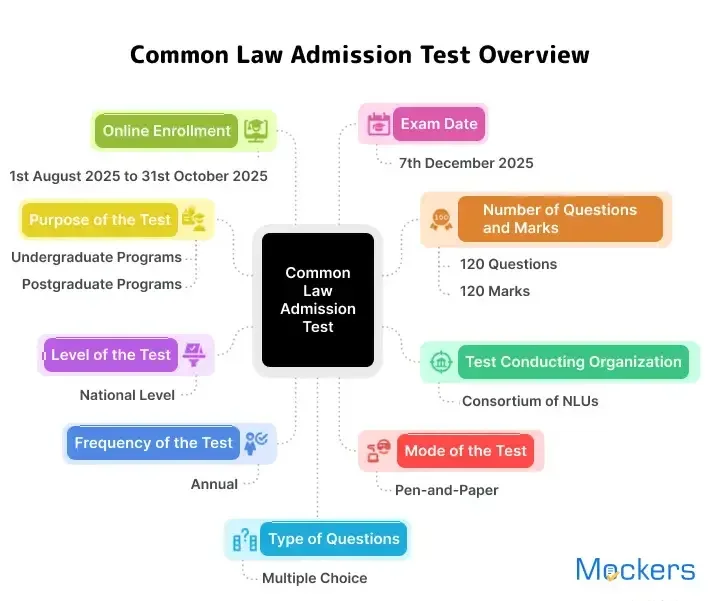


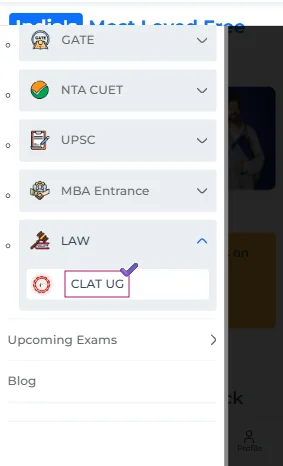
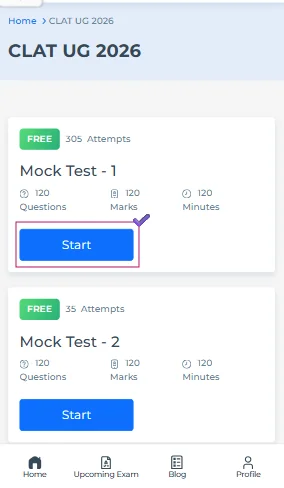
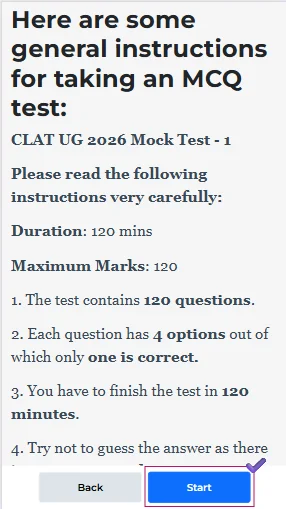
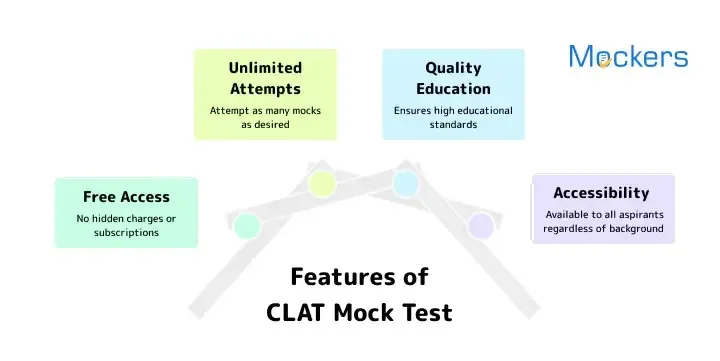












 Get latest Exam Updates
Get latest Exam Updates 



